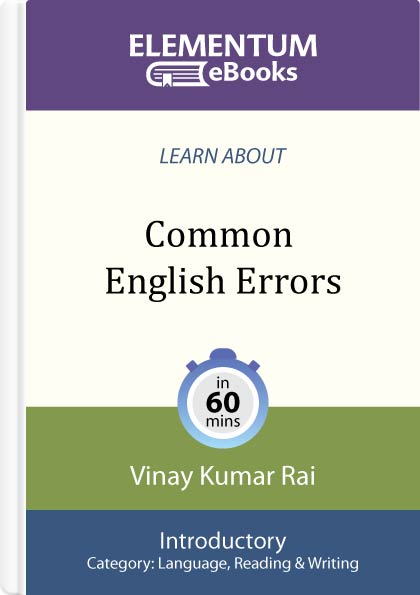
$4
This is a compilation of errors commonly found in written and spoken English from all over the world. While we should be more forgiving of errors in spoken English—after all, there are lots of things to consider when speaking—we should be more careful in our written communication, whether business or social.
Examples of the errors covered: ‘Advance’ versus ‘Advanced’;‘Alphabet’ versus ‘Letter’; use of the confusing word ‘Biannual’; ‘Complement’ versus ‘Compliment’; ‘Every day’ versus ‘Everyday’; use of the word ‘Literally’; use of punctuations such as semicolons and colons; and ‘Renown’ versus ‘Renowned’. We present 64 errors, one for every square of the chessboard.
Learn and follow these rules to write and speak more rigorously, and to make your communication clearer, less open to interpretation, more consistent. Treat them as little habits you need to build if you want to write and speak more clearly, employ the right words, or use fewer words.
Focus on errors you make repeatedly. Whenever you make an error you’ve made before, ask yourself why. What mental block is causing you to constantly think that way?
We provide tips to help you learn; many of the examples use quotes (who says we cannot have our spirits lifted in the process of learning?); and occasionally even throw in some humour. Learning, philosophy, and humour make for a great combination.
1. Alphabet vs Letter (MF)
An ‘alphabet’ is a set of letters arranged in a fixed order, used for writing a language. A ‘letter’ is any of the set of symbols used to write a language, representing a sound in the language. The English
language has an alphabet that contains 26 letters:
Here is a letter: A.
Here are all the letters of the English
alphabet: A, B, C, D, E, F, G, H, I, J, K, L, M, N, O, P, Q, R, S, T, U, V, W, X, Y, Z
2. All Together vs Altogether (MF)
‘All together’ is a phrase that means in a group:
Nobody can defeat you when you are all together. ‘Altogether’ is an adverb that means
‘in total’ or ‘completely’:
That’ll be $53.50 altogether, please. [In total] Beauty is altogether in the eyes of the beholder. (Lew Wallace) [Completely]
Tip:
‘All together is two words (implying ‘group’) so ‘Altogether’ must have the other meanings: ‘in total’ or ‘complete’.
Vinay Kumar Rai is an editor (he polishes someone else’s writing); a self-publishing consultant (he tells authors-to-be how to self-publish their books); a copywriter (he writes marketing copy for blog posts, brochures, DMs and eDMs, flyers, profiles, sales letters, Websites, etc); a writer (he writes educational articles for magazines and Websites); and a ghostwriter (he writes books for other people).
He’s been writing professionally since 2001 and for fun since he was six years of age, the latter being more than half a century ago.
His strength is in communicating difficult ideas and jargon. His clients are typically experts, publishers, or business people with products or services to market.
He has no wives, no kids, no pets, and no Pokémon. However, he does have a lot of books.
He’s really into Karma, the Golden Rule, first principles, mental models, universal laws, and philosophy.
He’s not a fan of the “My God true, your God false” types but he is a big fan of Alan Watts, Béchamp, Buckminster Fuller, Frederick Winslow Taylor, Friedrich Nietzsche, Giordano Bruno, Jiddu Krishnamurti, Nikola Tesla, Norman Borlaug, Oskar Schindler, Raoul Wallenberg, Rudolf Steiner, Socrates, Viktor Schauberger, and Swami
Vivekananda.
Vinay is the founder of Elementum.
Vinay Kumar Rai is an editor (he polishes someone else’s writing); a self-publishing consultant (he tells authors-to-be how to self-publish their books); a copywriter (he writes marketing copy for blog posts, brochures, DMs and eDMs, flyers, profiles, sales letters, Websites, etc); a writer (he writes educational articles for magazines and Websites); and a ghostwriter (he writes books for other people).
He’s been writing professionally since 2001 and for fun since he was six years of age, the latter being more than half a century ago.
His strength is in communicating difficult ideas and jargon. His clients are typically experts, publishers, or business people with products or services to market.
He has no wives, no kids, no pets, and no Pokémon. However, he does have a lot of books.
He’s really into Karma, the Golden Rule, first principles, mental models, universal laws, and philosophy.
He’s not a fan of the “My God true, your God false” types but he is a big fan of Alan Watts, Béchamp, Buckminster Fuller, Frederick Winslow Taylor, Friedrich Nietzsche, Giordano Bruno, Jiddu Krishnamurti, Nikola Tesla, Norman Borlaug, Oskar Schindler, Raoul Wallenberg, Rudolf Steiner, Socrates, Viktor Schauberger, and Swami
Vivekananda.
Vinay is the founder of Elementum.